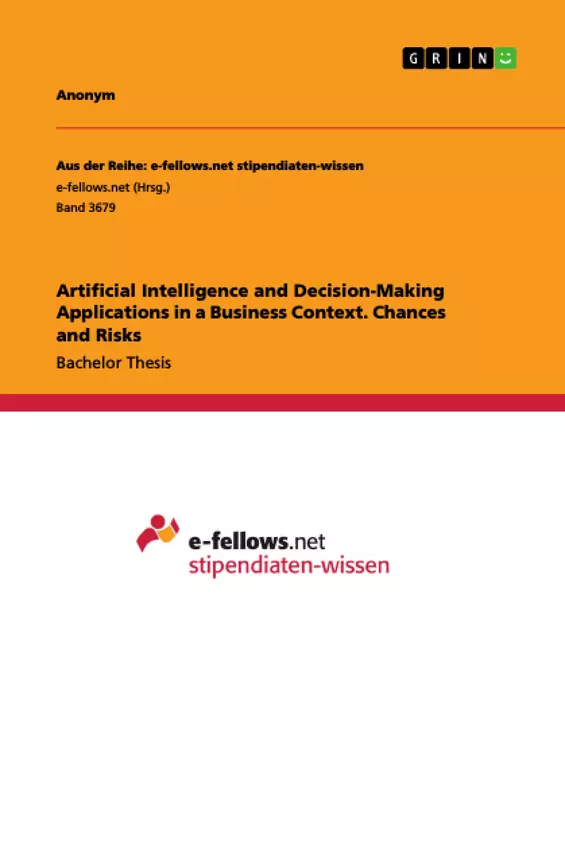This thesis is concerned with what AI is capable of in decision-making when involved in organizational decision-making processes or embedded in offered products that per-form decisions. It is also concerned with what is lost and what is gained through its use and which risks businesses face when applying it. It adds value to previous work conducted on challenges and risks by explaining these from a business perspective focusing on the economic implications for organizations. The resulting overview on chances and risks can serve organizations interested in AI investments to augment or automate decision-making in understanding the risk situation and potentials in this field.
In the first chapter AI is introduced in a comprehensible way for non-computer scientists and its relevance for business is outlined. Subsequently, decision processes and how humans and AI tackle them are explained which provides a foundation to under-stand respective strengths and limitations of humans and AI in decision-making. The third chapter explains how AI can be applied in decision-making in businesses processes and products that perform decisions providing benchmark examples. Autonomous driving and recruiting are presented as examples for decision automation and decision augmentation respectively on the basis of which benefits and challenges will be explained. Focusing on these examples aims at making the possible associated effects of using AI in decision-making processes more tangible and understandable for business professionals.
Inhaltsverzeichnis (Table of Contents)
- 1 Introduction
- 2 Artificial Intelligence
- 2.1 Definition of Artificial Intelligence
- 2.2 Development of Artificial Intelligence
- 2.3 Expectations on Artificial Intelligence
- 2.4 Artificial Intelligence technologies
- 2.5 Relevance of Artificial Intelligence for business
- 3 Decision-making
- 3.1 Human decision-making
- 3.2 Artificial Intelligence in decision-making
- 4 Applications of decision-making with Artificial Intelligence in business
- 4.1 Autonomous driving
- 4.2 Recruiting
- 5 Chances and risks
- 5.1 Chances in terms of cost reduction or increase in revenue
- 5.1.1 Improved efficiency
- 5.1.2 Increased decision quality in outcomes
- 5.2 Risks in terms of cost increase or decrease in revenue
- 5.2.1 Lack of social acceptance
- 5.2.2 Legal issues
- 5.2.3 Ethical issues
- 5.2.4 Decreased decision quality in outcomes
- 5.2.5 Technological errors and limitations
- 5.2.6 Workforce transition
- 5.3 Trade-offs concerning Artificial Intelligence-powered decision-making
- 6 Conclusion
Zielsetzung und Themenschwerpunkte (Objectives and Key Themes)
This bachelor thesis aims to analyze the potential opportunities and risks of using Artificial Intelligence (AI) in decision-making applications within a business context. The work explores the capabilities of AI, its development, and its relevance for business operations. It then examines how AI can be applied in specific decision-making processes, such as autonomous driving and recruitment.
- The definition and evolution of AI
- The applications of AI in business decision-making
- The advantages and disadvantages of utilizing AI for decision-making
- The ethical and societal implications of AI-driven decision-making
- The impact of AI on the workforce and the need for transition strategies
Zusammenfassung der Kapitel (Chapter Summaries)
Chapter 1 provides an introduction to the topic of Artificial Intelligence and its application in business decision-making. Chapter 2 delves into the definition and development of AI, exploring its key technologies and its growing relevance for businesses. Chapter 3 examines the concept of decision-making, contrasting human and AI approaches. Chapter 4 focuses on specific applications of AI-powered decision-making, highlighting examples like autonomous driving and recruitment. Chapter 5 analyzes the chances and risks associated with using AI for decision-making, including potential benefits like cost reduction and improved decision quality, as well as challenges like social acceptance, legal issues, ethical concerns, and workforce transition.
Schlüsselwörter (Keywords)
The key focus of this thesis lies on Artificial Intelligence (AI), decision-making, business applications, cost reduction, revenue increase, efficiency, decision quality, social acceptance, legal issues, ethical concerns, technological errors, workforce transition, and trade-offs related to AI-powered decision-making.
- Quote paper
- Anonym (Author), 2020, Artificial Intelligence and Decision-Making Applications in a Business Context. Chances and Risks, Munich, GRIN Verlag, https://www.grin.com/document/974846



